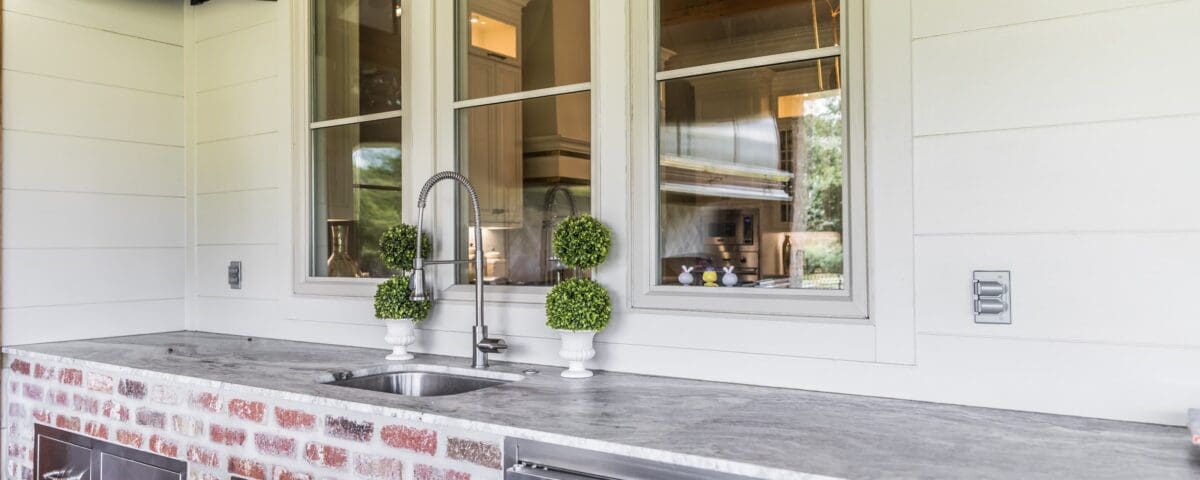
Top 5 Reasons to Choose GE Appliances for Your Lafayette Home
March 18, 2024
Bathroom Safety Tips for Kids and Seniors
April 15, 2024Spring is here, and it’s the perfect time to get your outdoor kitchen fired up and ready for action! But before you start flipping burgers and grilling veggies, let’s talk about safety. It’s not just about avoiding a few minor burns; it’s about making sure every cookout goes off without a hitch.
That’s why we’re here to share some essential safety tips that’ll help you maintain a tip-top outdoor kitchen, so you can focus on enjoying quality time with family and friends while keeping the risks at bay.
Proper Installation and Setup
Picking the Perfect Spot for Your Outdoor Kitchen Appliances
If you’re just starting out on your journey to build your own outdoor kitchen, the first step is to choose the perfect location. Take a moment to think about where you want to put it.
You’ll want a spot that’s convenient for cooking and entertaining but also safe and practical. Consider factors like distance from your indoor kitchen, proximity to seating areas, and access to utilities like gas, water, and electricity.
Give Your Outdoor Kitchen Appliances Room to Breathe
Ventilation and clearance are key when installing outdoor kitchen appliances. Make sure there’s plenty of space around grills, smokers, and other cooking equipment to prevent heat buildup and fire hazards.
If your appliances are under a roof or enclosure, make sure there’s adequate ventilation to prevent carbon monoxide buildup and keep your cooking area comfortable.
Guidelines and Codes for Outdoor Kitchen Appliances
Before you start building your dream outdoor kitchen, make sure you’re following the manufacturer’s instructions and any local building codes.
These guidelines are there to keep you safe and ensure your outdoor kitchen appliances are installed correctly. If you’re unsure, don’t be afraid to ask for help from a professional.
Read also: Tips to Weatherproof Your Outdoor Kitchen
Regular Maintenance and Upkeep
Keeping your outdoor kitchen appliances spick and span is not just about looking good. It’s about safety and making sure your gear lasts longer. Imagine firing up a grill that’s all gunky – not only does it kill the vibe, but it can also be a fire hazard.
Grills
After each use, let it cool, then brush off the grates. Once in a while, go for a deep clean: take out the parts, scrub them down, and check for any damage or grease build-up.
Smokers
Regularly empty the ash and check the wood chips or pellets. Make sure the interior is wiped down to avoid any residue that could affect the flavor of your smoked delights.
Pizza Ovens
Ash and food bits can pile up here. Regularly sweep it out and give the stone a good scrape. A clean oven means tastier, crispier pizzas.
Outdoor Refrigerators
Your outdoor fridge isn’t just a box for chilling drinks. It needs regular checks to keep it in top shape. Dust off the condenser coils, check the door seals, and make sure it’s not overpacked.
Storage
Storage units should be dry and organized. No one likes a moldy surprise with their outdoor dinnerware.
Safe Cooking Practices
Outdoor kitchens are awesome for whipping up a feast under the sky, but they come with a twist – keeping food safe. It’s simple: keep raw and cooked foods separate and make sure everything stays at the right temperature.
Got leftovers? Pack them up and chill them quickly. You don’t want your outdoor party remembered for the wrong reasons, like foodborne illness.
Temperature and Time Matter
Different foods need different heat levels and cooking times, especially outdoors. A meat thermometer is your best bud to make sure your steaks are more than just grill-marked, but also safe to eat. Chicken, beef, or your veggie patties, each has its sweet spot temperature to hit the right taste and safety.
Choose the Right Tools
Grabbing that steak off the grill with your fingers? Bad idea. The right tools, such as tongs, gloves, aprons, keep you safe and make you look like a pro.
Protective gear isn’t just for show; it guards against splatters and burns. And let’s not forget about cleanliness. Keep those utensils clean to avoid cross-contamination.
Fire Prevention and Emergency Preparedness
Spotting and Stopping Fire Risks in Your Outdoor Kitchen
Cooking outside is great, but where there’s heat, there’s potential for fire. Keep flammable stuff like paper towels or oven mitts away from the grill. Make sure your outdoor kitchen appliances are in good shape, and no gas lines are leaking.
Handling Flammable Materials
Store fuels for your grill or smoker properly, away from heat sources and out of children’s reach. And remember, never try to reignite a grill immediately after it goes out. Give it time, about five minutes, to air out.
Fire Extinguishers and Emergency Action Plans
Having a fire extinguisher nearby isn’t paranoid; it’s smart. Make sure it’s the right type for a kitchen fire and that you know how to use it.
Also, have an emergency plan in place. Everyone using the outdoor kitchen should know what to do and where to go if a fire breaks out.
Read also: How to Choose an Outdoor Kitchen Sink for Your Home
Your Safety is in Your Hands
Safety isn’t just a nice-to-have; it’s a must. An outdoor kitchen is about enjoying good times, but it only takes a second for things to go south if you’re not careful. Prioritize safety, and you’ll be setting yourself up for many awesome cookouts without the worry.
If you’re in the Lafayette area, why not stop by our outdoor kitchen appliance store? Our showroom at Facets of Lafayette is packed with the latest appliances that marry style with safety.
So, come by and see the options we have for making your outdoor kitchen a safe and exciting space to cook and entertain.



